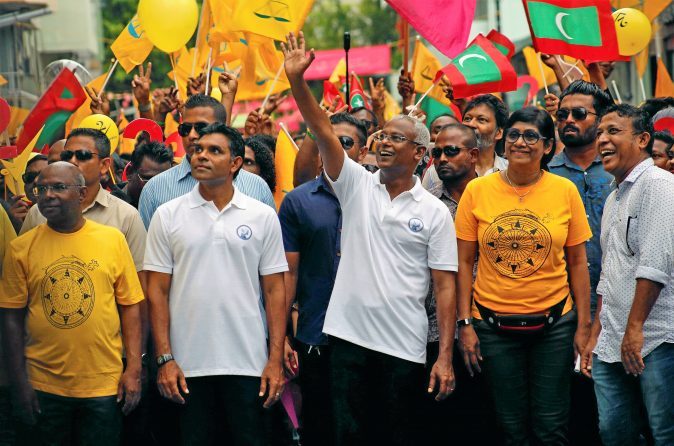Politics / Maldives
Making new ties with old friends
The Maldives turns the page on a cloudy recent past and pushes forward with measures to strengthen democracy and transparency, rekindling its ties with its Western allies.

The Maldives is at the dawn of a new era. The campaign that saw the ascension of Ibrahim Solih to power in December 2018 was grounded on two very clear goals; fighting corruption and reinstating the country’s alliances with the West.
Over the last few years, the Maldives have driven most of its foreign policy attention towards one specific ally, China. The Asian giant is the country’s biggest source of tourists and has proven a generous friend, providing credit lines and support for infrastructural development. However, this China-centric focus represented a move away from the country’s allies in the West. The Maldives exit from the Commonwealth of Nations in 2016 and its progressive absence from top level meetings at the UN and other institutions has made the island nation ever more isolated.
That is the trend that the Solih administration is trying to reverse. The president’s first official visit to India immediately paid off, with the Indian government offering $1.4 billion in credit lines, currency swaps and grants for development projects. Other meetings followed a line of widening friendships, from the Middle East, to the US and Europe.
Today, the Foreign Ministry is actively seeking re-ascension to the Commonwealth, and other cabinets are building partnerships wherever they go. Singapore and Thailand have pledged to help in training staff for the aviation sector; there is an agreement on the table to start security cooperation with Sri Lanka; and, in May, the minister of Foreign Affairs returned from Romania with an MOU pledging to strengthen ties on trade, economy and education. High-level meetings with US representatives are also at a five-year high.
This renewed openness to international partners is granting the Maldives a number of social and economic benefits, but also a stronger voice in the international stage. The country is now retaking its global position as an environmental champion, ensuring that climate change mitigation remains at the center of the international debate.
Old sins cast long shadows
However, the international image of the Maldives will not be repainted solely with international partnerships. Over the last few years, the country has been plagued by issues of nepotism and corruption. Scandal after scandal involving one or another state-owned company have tarnished public trust both nationally and abroad. Most notably, the $80 million embezzlement case involving the Maldives Marketing and PR Company that resulted in the imprisonment of several high-ranking government officials, including former president Abdulla Yameen in March 2019, was a staple of the structural issues in the country’s public sector.
The Maldives scored 31 out of 100 in Transparency International’s Corruption Perception Index in 2018, ranking 124th out 180 countries. The international NGO places the average score for Autocratic Regimes at 30 out of 100. This is a dire blow for this young democracy, and an important mark to try and change in the years to come.
The new administration approached this issue head first. In its “First 100-Days Pledge”, president Solih said he would establish “a committee and launch investigations into state funds lost through corruption” on his first day, which he did. Within the first month of his presidency, he launched a whistleblower website and started a campaign of zero-tolerance on corruption. More impressively, all public officials and their families, including government ministries, public companies and independent institutions, were required to publicly declare their assets. These were very welcome and much needed measures to project an image of transparency, but more structural problems might be harder to change.
We will certainly wait and see, but after years of tarnished reputation, the Maldives could do well with an honest attempt at cleaning up its judicial act and moving towards transparency and accountability. The signs of change bring hope, but only time will tell.
